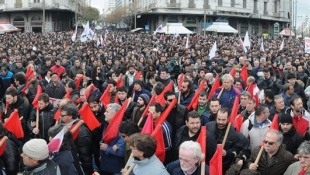Translated "Avante!" article by Pedro Guerreiro, member of the Central Committee and of the International Department
The events in Egypt - which have been happening following the Tunisian people’s struggle, and provoking shockwaves throughout the Arab world - are of major importance.
Independently of its immediate outcome, the popular rise within Egypt constitutes thereupon, a huge qualitative step amid its people’s struggle against an oppressor regime, headed by Hosni Mubarak and supported by imperialism. In the sequence of a longtime resistance and face to face to a brutal repression - a “state of emergency”, which lasts since 1981 - workers and youth of the most populous Arab country, trembled the foundations, in only seven days, of a regime which exploits and oppresses for 30 years.
The Egyptian people identified the responsible for the situation and rose, once again,against unemployment and poverty, for better life conditions, against oppression, its own national dignity and of the Arab peoples‘, against subservience beforethe USA and the complicity with Israel’s Zionism.
For its important dimension, localization and strategic interest - it is enough to mention the Suez Canal - , Egypt has been the crucial pillar amid the Arab world for the USA’s strategic domain in the Middle East, North Africa and the Mediterranean. The establishment of diplomatic relations between Egypt and Israel and the Camp David agreements’ signature, in the USA, in 1979, marked out an important divisionamong the Arab world and a deep change within the correlative forces in the region in favour of imperialism.
As recurrently remembered, Egypt is the second country receiving more financial means from the USA in order to purchase weapons for military purposes, only supplanted by the USA’s support to Israel.
Before the popular raising against oppression, capitalism seeks to conceal, alias in a hastily manner, its deep links and political, economic and military support unto Arab dictatorship regimes, with whom it shares the peoples’ and their resources exploitation.
Observing the PS’s International Socialist (IS) : rushing, it might expel the “Democratic Constitutional Assembly”, days before dictator Ben Ali’s own party, was dissolved before a resolute demand of the Tunisian people; the IS might claim hypocritically for the Egyptian people’s freedom and rights; and when it omits, suitably, that Mubarak’s Democratic National Party is its member, it is too late in the attempt of whitening its complicity with the brutal oppression which has fallen and falls upon these peoples.
Therefore, the alarm, embarrassment and the attempts of keeping (at a term) Mubarakor, looking for any other immediate way out, engaged by the USA and its European Union allies - watch the common position of Germany, France and Great-Britain -, in order to hold back the popular rebellion, exploit its contradictions and weaknesses, limit its purposes and consequences, at length, avoiding it might set out towards a national and democratic revolution.
There is much in stake for imperialism, as it knows the class struggle’s outcome in Egypt at the current moment will produce deep repercussions both throughout theArab world and in the Middle East’s situation evolution and, therefore, within the international situation.
The popular rising in Tunisia and Egypt demonstrate how correct the thesis is, within the class struggle acuteness, at the current moment, in which great dangers for peace, freedom and the peoples sovereignty coexist together with real potentialities of progressive developments and even of revolutionary nature, stands the possibility of sudden and unforeseen developments, which outcome will depend on the peoples capacity of turning popular rebellions unto change processes, as a threat to the great capital and imperialism.


